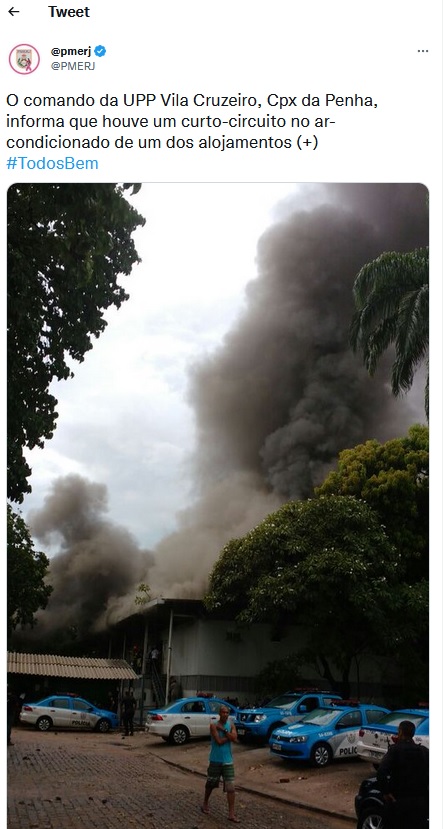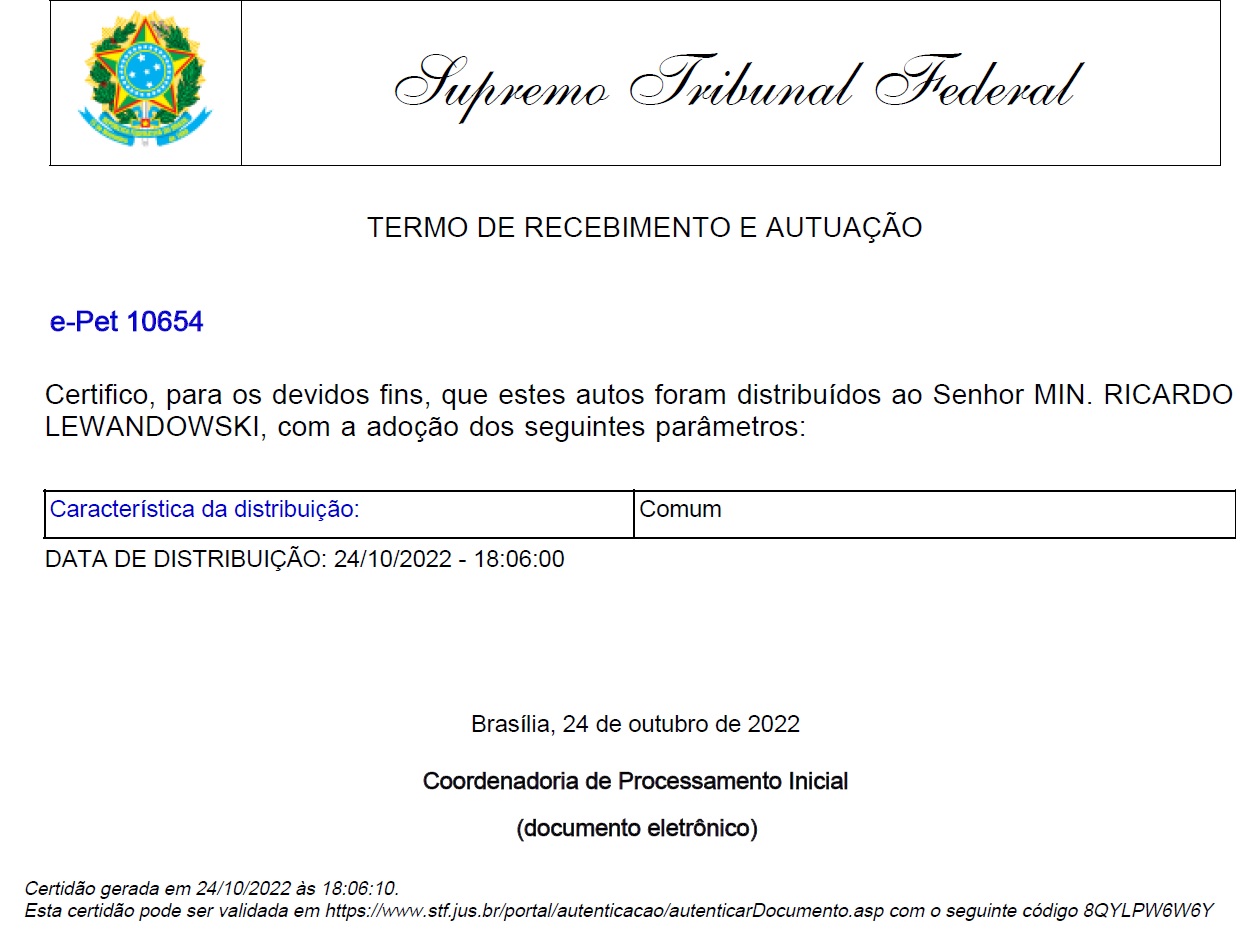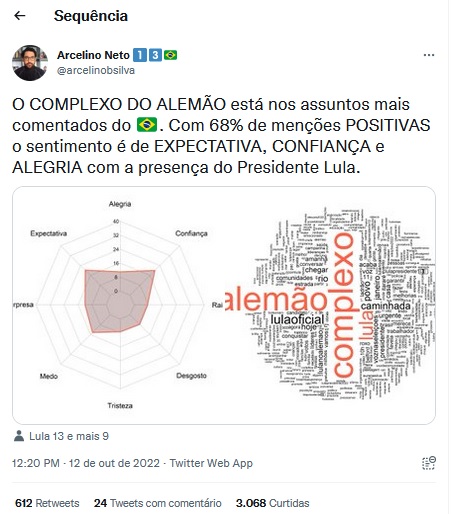
Clique aqui para Português
The three-letter abbreviation for the favelas of Complexo do Alemão, “CPX,” was used by Brazil’s far-right to produce fake news that associated Lula and favela residents with organized crime.
With less than a week to go before the second round of the 2022 elections, Complexo do Alemão—a group of 13 favelas in Rio de Janeiro’s North Zone—once again became one of the most talked about topics in Brazil according to Google Trends.
Current presidential candidate and former president, Luiz Inácio “Lula” da Silva, known for policies that sharply reduced Brazil’s inequality in the 2000s, participated in a rally in Complexo do Alemão on October 12. He started the day at the headquarters of internationally known community newspaper Voz das Comunidades in the lower area called Morro do Adeus, meeting with community organizers from the favelas. He then marched down the Complexo’s main road, Estrada do Itararé, with thousands of residents of Alemão and neighboring favelas, along with activists from various political and social movements. During the walk, Lula was given a cap with the letters CPX on it—an affectionate abbreviation for Complexo do Alemão. The moment Lula received the cap as a gift was broadcast live on YouTube.

Estrada do Itararé is the main road that cuts through the neighborhood of Ramos towards Inhaúma. It provides access to the favelas of Complexo do Alemão with bus stops and taxis. Schools, an Emergency Care Unit (UPA), supermarkets, bars and restaurants are also located along the road. Lula’s visit was thus in the entryways to the favela, rather than deep inside the community.

It didn’t take long for Brazil’s far-right to build a fake news narrative around the event, trying to convince the public that CPX represented the term “cupinxa” instead of complex. The word is actually spelled with a “ch” (cupincha) and refers to “an individual with whom one has friendship, companionship, [someone who is] a comrade.” They launched the rumor that the cap received by Lula represented a link between him, the residents of Complexo do Alemão, and drug traffickers.

GloboNews reporter Flávia Oliveira highlighted that since the favelas are majority black, the spread of this misinformation was in fact racism reflecting the criminalization of the working poor:
“Criminalizing CPX, which Rio knows is short for Complexo do Alemão, is abhorrent to the favela. It’s racism. There’s no other name [for this].”
It is important to note that the use of the acronym CPX is widespread, having even been used by the Military Police of Rio de Janeiro (PMERJ) to refer to the favela complexes. In a post published in 2017, the PMERJ used the acronym to refer to Complexo da Penha.
The acronym also appears in the 2023 Budget Guidelines Law for the State of Rio and in songs that mention favelas. Despite all of this, in the last stretch of the presidential race, Bolsonaro has been seen using the acronym to make racist public statements that criminalize poverty and stigmatize the favelas.
Disgusted by the president’s words, a CPX resident has denounced Bolsonaro (Liberal Party, PL) to the Supreme Court (STF) for the crime of slander. In an excerpt from the lawsuit, the resident’s defense states:
“This is a criminal case aimed at convicting [Bolsonaro] of the crime of slander since the undue association of the acronym ‘CPX’—which in fact represents the expression ‘Complexo de Favelas’—directly to drug dealers and organized crime is a serious offense to the reputation of the residents of Complexo do Alemão.”
The complaint was filed on October 21 and will be addressed by Supreme Court Justice Ricardo Lewandowski. In the lawsuit, the resident’s legal team claims that Bolsonaro committed a crime by associating the acronym CPX with organized crime.

In the lawsuit, the resident classifies Bolsonaro’s speech as prejudiced and based on fake news and misinformation. He cites an incident during a nationally televised electoral debate where a confused Bolsonaro mistook Complexo do Alemão for Complexo do Salgueiro, in an attempt to link Lula’s visit to Alemão with organized crime. Bolsonaro said:
“I know Rio de Janeiro. You visited Complexo do Salgueiro. You didn’t have a single policeman by your side, only drug dealers. Your affinity with drug dealers and criminals is so real that in Brazilian prisons you received four out of every five votes.”
In fact, those who invited and accompanied Lula in Complexo do Alemão were well-respected and beloved long-time community organizers from a number of favelas. An excerpt from the lawsuit reads: “these prejudiced statements—made on national television, even—further marginalize thousands of honest people who live in the region and who are often also victims of violence.”
It then adds:
“It should be noted that the president, despite claiming to know Rio de Janeiro, confused Complexo do Salgueiro with Complexo do Alemão—where the event he was referring to took place. But worst of all was that even after having had enough time to inform himself about the real meaning of ‘CPX’, [Bolsonaro] continued to dismiss all the residents and participants of candidate Lula’s rally claiming there were only ‘traffickers’ next to him.”
Compartilhem!!!
SALVEM ESSE VÍDEO, JOGUEM NOS GRUPOS!
BOLSONARO NAO GOSTA DE POBRE! FAVELADO NAO É BANDIDO pic.twitter.com/NxkIaqEISd
— Rene Silva 🇧🇷 CPX (@eurenesilva) October 17, 2022
Tweet by Rene Silva:
Share this!!! SAVE THIS VIDEO, SHARE IT IN YOUR GROUPS! BOLSONARO DOESN’T LIKE POOR PEOPLE! FAVELA RESIDENTS ARE NOT CRIMINALS
IT’S OFFICIAL! BOLSONARO DOESN’T LIKE POOR PEOPLE AND FAVELA RESIDENTS!
In an interview with RioOnWatch, Rene Silva, founder of the newspaper Voz das Comunidades who played host to Lula in Complexo do Alemão, said that Bolsonaro’s comments aim to capitalize on society’s prejudice against the favela and the poor to win votes. However, Rene believes that the majority of the population does not agree with this form of discrimination:
“I am not surprised by Bolsonaro’s statement, for the simple fact that he has always made it clear that he doesn’t like poor people. He was against all social welfare programs until he realized they were a political strategy to get votes. But even before he was elected in the first place, he was against Bolsa Família, Minha Casa Minha Vida and several programs created by the Worker’s Party. I believe that many people don’t think this way. So, seeing a president who thinks like that, it’s time to rethink your vote.”
The spread of fake news about the acronym CPX follows the strategy of repetition in different content distribution networks. This strategy has been used by the Bolsonaro campaign throughout the first and second rounds of voting. The legal teams of the two presidential candidates have been fighting battles in the Superior Electoral Court (TSE) due to the use of fake news by different publications and programs. In all, there have been 72 rulings favorable to Lula’s campaign, compared to six in favor of Bolsonaro.
In this confrontation, the favelas of Rio de Janeiro and particularly Complexo do Alemão have been the target of misinformation, criminalization, social prejudice, and structural racism, through false content that links Lula and residents to crime.
Between October 12—the date of the PT candidate’s visit—and October 13, posts making these false associations gained a total of at least 345,000 likes on Instagram, 54,000 interactions on Facebook, and 42,000 on Twitter, according to a survey by the fact checking agency Aos Fatos.
According to Aos Fatos, on Instagram and Facebook the fake news was spread in posts by Federal Deputy Carla Zambelli (PL-SP) and Senator Flávio Bolsonaro (PL-RJ)—coordinator of his father’s reelection campaign. On October 17, Supreme Court Justice Carmem Lúcia ordered Twitter to remove Senator Flávio Bolsonaro’s post.
According to Letícia Mounzer, the attorney providing legal counsel on the lawsuit, the criminal complaint “reiterates that Bolsonaro’s speeches are not protected by freedom of expression, since he attacks the honor of the resident [who took the case to court] and all the residents of Complexo do Alemão, inducing his followers to believe that all the community’s residents are involved in crime,” she said in an interview with newspaper O Dia. An extract from the lawsuit states:
“It just so happens that, contrary to [Bolsonaro’s] statements, the population gathered peacefully, without weapons, in an event that took place legally. On the other hand, it is worth mentioning that there are about 300 rifles in Complexo do Alemão. In other words, the total number of drug traffickers operating in the region is very low compared to the local population of 250,000.”
The court is asked to impose the maximum penalty which—according to article 140 of the Penal Code—is either detention for one to six months, or a fine, “with the triple penalty increase of article 141, item 2 of the Penal Code, since the crime was also disseminated on social media.” The lawsuit asks the Supreme Court that in the event that any fine is applied, the proceeds be delivered to organizations that address violence in Complexo do Alemão.
How Did the Fake News About the CPX Cap Start?
The narrative linking Lula to organized crime started at the beginning of October, just before the first round of voting, using information whose dissemination is banned by the Superior Electoral Court (TSE), as published by Agência Pública.
A manipulated audio links Lula to Marcola, leader of the PCC [the First Command of the Capital, considered Brazil’s largest criminal organization]. However, the “Marcola” mentioned by Lula in the recording of April 4 of this year, is sociologist Marco Aurélio Santana Ribeiro, an advisor to the Workers’ Party, and not Marco Williams Herbas Camacho, the drug lord, who is in prison.
On October 8, President Bolsonaro himself retweeted the fake news on his Twitter profile. Between the final round one debate and election day, Bolsonaro called Lula a criminal on at least 34 occasions, as compiled by fact-checking platform Aos Fatos, based on [automatic speech transcription] tool Banco de Discursos. However, this narrative gained more traction after former president Lula visited Complexo do Alemão.

The event in Alemão was organized by community leaders from the community and various favelas and social movements in conjunction with the Rio de Janeiro city government, municipal secretariats, and the Municipal Guard. The Military Police and the Federal Police accompanied the former president on his journey.
During the October 12 march, Complexo do Alemão had 68% positive mentions on social media, boosted by feelings of “anticipation, trust and joy,” as analyzed by Arcelino Neto, a social media specialist.
The following day, October 13, CPX figured among the most talked about topics on Twitter; however, this time, it was due to posts that criminalized the residents of Complexo do Alemão and associated Lula and the favela’s leaders with [criminal organization] Red Command.

Neto revealed that the march “mobilized 48,975 [Twitter] accounts, 203.566 interactions, 1,175,670 likes and was the most talked about topic in Brazil. The reason for the high number of interactions was the presence of President Lula in CPX (Complexo do Alemão).”
He went on: “Bolsonarist engagement with leftist tags was atypical, with the participation of 17,456 (35.6%) profiles and 50,976 (25.0%) interactions. They realized the event’s importance in the streets and on social media and started various fake news reports.”
Jaqueline Santos, a resident of Complexo do Alemão, states that she spent all night responding to comments from Bolsonaro supporters on Twitter in an attempt to establish the truth about the event:
“Wow, I’d had a wonderful day. It was an amazing holiday [Our Lady of Aparecida Day] with Lula coming here. My whole family went to see him. After all, he’s the first presidential candidate to ever come here, to talk to the favela. Then, I went on Twitter and this nightmare began. I saw a huge number of lies. CPX has always been the abbreviation of Complexo do Alemão. It’s part of our identity. Everyone here talks that way.”

Before that, on October 10, fake news about the visit to CPX had already started, as reported by local newspaper Voz das Comunidades. The criminalization of favela residents and of former President Lula perpetrated by the far-right campaign did not accidentally arise from the CPX initials. It is a Bolsonarist campaign strategy.
In contrast, Rene Silva, Camila Moradia, Raull Santiago, alongside journalists from various media outlets, wrote articles informing the population about the lie. Celebrities got involved producing content that deconstructed the narrative created by the fake news. The hashtag #CPXDeservesRespect became a form of counternarrative against the criminalization of poverty and racism inherent in this incident.
Furthermore, TSE Judge Paulo de Tarso Sanseverino ordered that posts made by profiles in support of Bolsonaro stating lies about the initials “CPX” be deleted. The judge gave Twitter five hours to remove the fake news, threatening a daily fine of R$50.000 (US$10,000) according to news platforms Jota, Jornal do Brasil, CNN Brasil, Estadão, among others.
The CPX Cap: The Criminalization of Symbols of Resistance
The CPX cap has become a fashion must, worn by residents of Complexo do Alemão and other favelas, parliamentarians and even celebrities such as Xuxa Meneghel, Felipe Neto, Camila Pitanga, and many others. Be it on Twitter or Instagram, everyone’s question is the same: “people, where can I get the CPX do Alemão cap? Where can I find it? Does anyone know?”

“We’ve got orders from everywhere in Rio and even from other states. Some people come here to pick theirs up. Others ask us to send them to the South Zone or Barra da Tijuca by express mail and even Uber Flash,” said another employee at the cap factory.
Riding on the coattails of this huge success, Voz das Comunidades is giving a cap to whoever donates a basket of basic foodstuffs. Those who donate R$150 (US$30) or more for food to help families in Complexo do Alemão get a cap as a thank you.
